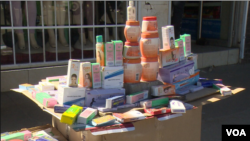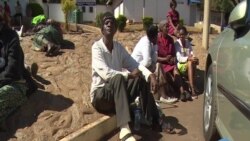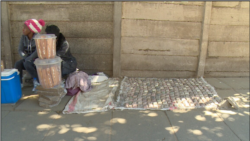Zimbabwe’s Association of Healthcare Funders says the number of people seeking medical help has fallen by 50 percent since last year because of the rising cost of drugs not covered by insurance. Many Zimbabweans are turning to herbal treatments that health analysts warn are not always helpful.
But President Emmerson Mnangagwa’s government says a solution is on the way.
Fifty-one-year-old Nkululelo Mbambo broke his right ankle. He is outside Harare’s Parirenyatwa hospital after being discharged.
Mbambo says he has no painkillers or any other drugs provided by the doctors to help him recover. He says his medical insurance is not being accepted by many health institutions and pharmacies.
“They said they are taking too long to pay for the services,” he says of his insurance provider. “So at times we pay cash if they do not accept these medical insurances. You know nowadays cash is scarce to get. That’s a big challenge.”
It is people like Mbambo who, according to the Association of Healthcare Funders, either limit their medical treatment or do not seek it out at all. They have medical insurance but health institutions do not accept it, or the cost of health services has gone beyond their coverage.
Herbs sold on the street
With nowhere else to turn, they seek out medical drugs or herbs sold on the street. Their sellers do not want to be identified for fear of being arrested.
This herbalist insists her products are a good replacement for medicine.
“So it is money problems and the strength of herbs which make people use them (instead of medicines). Some say medicines are now expensive but it is the strength of herbs, which bring them here after hearing from those who would have been healed.”
But Dr. Norman Matara from the Zimbabwe Association for Doctors for Human Rights says herbs are not the answer to the rising price of drugs and health care.
“Some of the herbs used have not been tested in the lab,” he said. “We do not know their effect on the liver, on the kidneys. We might actually end up having kidney failure from using herbs which have not been scientifically proven to be safe and effective.”
So what should be done?
“We really urge the government to consider investing into health care and providing national insurance scheme which is pro-poor people,” Matara said.
Government works on a solution
Zimbabwe’s minister of health and child care, Obadiah Moyo, says the government is working on the issue and it has started sourcing medical drugs. He says that Wednesday, the government of India donated drugs worth a-quarter-million dollars.
“The more medicine that we get, the less will be the cost to the client, so we are working on a plan that we fill up our warehouses, or pharmacies to the brim,” he said. “And we then shall be able to supply through that same mechanism, the private pharmacies. They will have to reduce their prices and we end up with more patients arriving at the institutions.”
Lower prices would be good news for people like Nkululeko Mbambo who cannot get the medications they need for a full and fast recovery.











